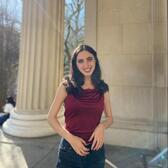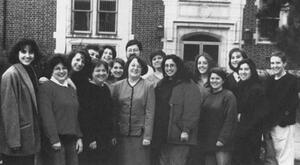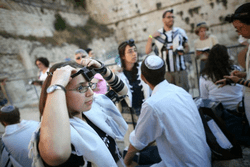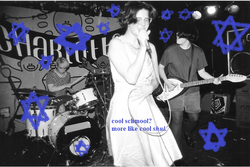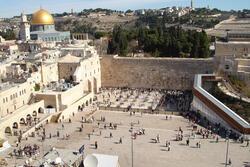Growing Up in a Feminist Jewish Community
What is history to one generation is commonplace to another. Here is Sally Priesand (center) on her visit to Hebrew Union College - Jewish Institute of Religion on the twenty-fifth anniversary of her graduation. Everyone else in the picture is a rabbinical student, except for Karla Goldman, second from right, a faculty member.
Institution: Karla Goldman
Judaism has been a major part of my life since before I can remember. In preschool, we “lit” wooden Shabbat candle toys every Friday afternoon and “baked” plastic challahs in the pretend oven. In kindergarten, I started at my reform Jewish day school, the Rashi School, where we attended school-wide Kabbalat Shabbat services and celebrated Jewish holidays by doing fun activities. As I grew older, I started to notice how our teachers were weaving Jewish values into our lessons. I took Judaic Studies every day, where I took part in intense discussions of the Torah, Talmud, and other Jewish texts, and learned how they pertain to a modern Jewish lifestyle.
Through these experiences, Jewish values like community, tzedakah, and learning have been incorporated into my life, teaching me the importance of being kind, charitable, and curious in all situations. Feminism, with its values of equality, education, and respect, goes hand-in-hand with all the Jewish values that I’ve learned, and that’s one of the reasons why feminism seems so natural to me.
There’s another major reason why feminism and Judaism just seem to blend, and that’s that I’ve always had Jewish female leaders in my life. At my conservative temple, Temple Emanuel, two out of our three rabbis are women. This is the biggest conservative temple in New England, and it is thrilling to me when thousands of people pour in for the High Holidays to watch women lead services. I know that some synagogues aren’t as accepting of women taking on leadership roles, and I find it inspiring that my temple is so encouraging and supportive. Although the stereotypical rabbi is an old man with a white beard, at my temple energetic young women rabbis lead the service. I can relate to them, which helps me feel more connected to Judaism (no offense to old men with white beards).
The two appointed rabbis at my day school? Both women. One of these rabbis in particular made a big impact on my life. She is the middle school rabbi, and is in charge of the school’s eighth grade trip to Israel each year. Her passion and enthusiasm about Israel and Judaism touch even the most blasé students. I remember her leading a Shabbat service on the platform above the Western Wall for my grade. I was struck by the juxtaposition of the old—the wall with its mechitzah barrier between men and women, and the new—our female rabbi powerfully leading the service. My vivid memory of that scene is one of my strongest associations with Judaism. Our school rabbi taught me that even though our culture is thousands of years old, there is still room for me and other young women to play an important role.
Many of the other teachers at the Rashi School are successful Jewish women as well, incorporating both messages of Jewish core values and feminism into their lessons. Another example of a strong woman who instilled both Judaism and feminism in me was the Social Justice Coordinator at Rashi. Her job is dedicated to organizing social justice projects and other mitzvot for the school to do, and to educating us about tikkun olam. She was a big part of my childhood and that of all the other students, emphasizing the importance of tzedakah and mitzvot, of sticking up for what you believe in, and of being true to yourself. Because of what I learned from her, at a young age I became very involved in social justice, and learned that I can apply my passions and interests to do good for others.
So, my feminism and Judaism have always intersected in my life, but as I grew older I realized that supportive communities like mine are pretty rare. Sheltered by my small, liberal Jewish community for all those years, it was hard for me to understand at first that women don’t always have the same opportunities as men. Most of the women in my life had leadership roles and were frequently running the show. They have all had such an impact on me, making me feel more connected to and included in Judaism, and teaching me that one young girl can actually make a difference in the world. My hope is that every Jewish—and non-Jewish—little girl can have a community full of strong women leaders and role models like I have had.
This piece was written as part of JWA’s Rising Voices Fellowship.

